Assassin’s Creed Origins Review
Assassin’s Creed Origins
Review: The best one yet
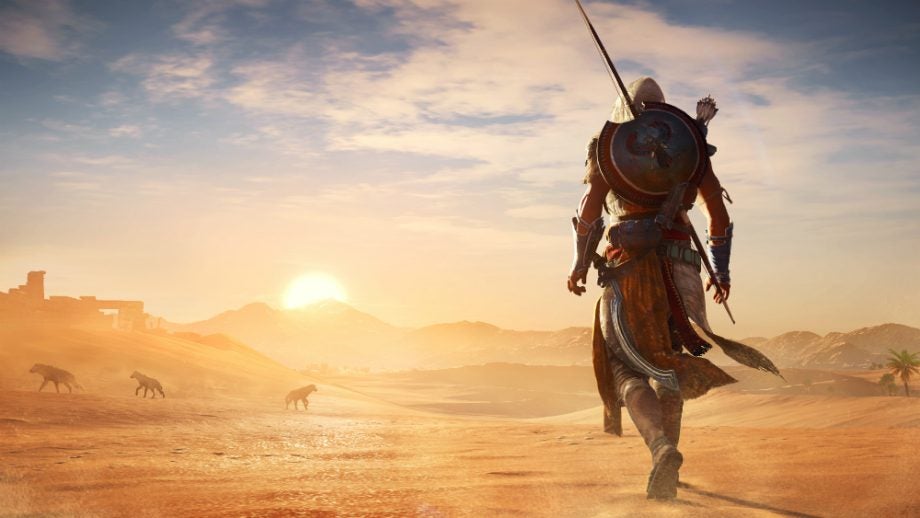
Verdict
Pros
- The best setting the series has ever seen
- Updates to formula make it fresh once again
- Bayek is an excellent lead
- Absolutely beautiful visuals
Cons
- Somewhat lacking in original ideas
- Story falters in the final act
- Can be a little too easy at times
Key Specifications
- Release Date: October 27
- Genre: Action-adventure
- Developer: Ubisoft
Order Assassin’s Creed Origins from Tesco | Amazon.com
Our resident Assassin this time is Bayek, an ancient warrior pledged to protect the ruler of Egypt. Bayek is my favourite lead in the series yet, beating the likes of Ezio Auditore and Edward Kenway thanks to his tragic backstory, which he isn’t afraid to mask with humour, and a genuine care for others. His compassion is shown in how he interacts with civilians, befriends animals and only ever assassinates those who deserve it. Unless I press the wrong button – then he’s cold-blooded killer.
Bayek is joined by Aya, his loving wife and a capable warrior in her own right. The rest of Origin’s supporting cast is equally strong, featuring the likes of Julius Caesar, Cleopatra and a handful of original characters that sadly sit on the sidelines as the plot becomes muddled during its inconsistent final act. Ubisoft once again splices its historical world with our own, transporting us into a modern setting for clumsy, hamfisted sequences that don’t justify their existence.
I get the impression that Ubisoft is afraid to go all-in with the sci-fi elements it has teased for years. Instead, it dances on the border between historical accuracy and overblown supernatural nonsense, which has me questioning why the latter was ever introduced to begin with. I won’t spoil anything major, but watching the main characters act completely oblivious to what should be world-changing discoveries is jarring, leaving me frustrated instead of enthralled by the unfolding drama.
Related: Assassin’s Creed Origins Guide
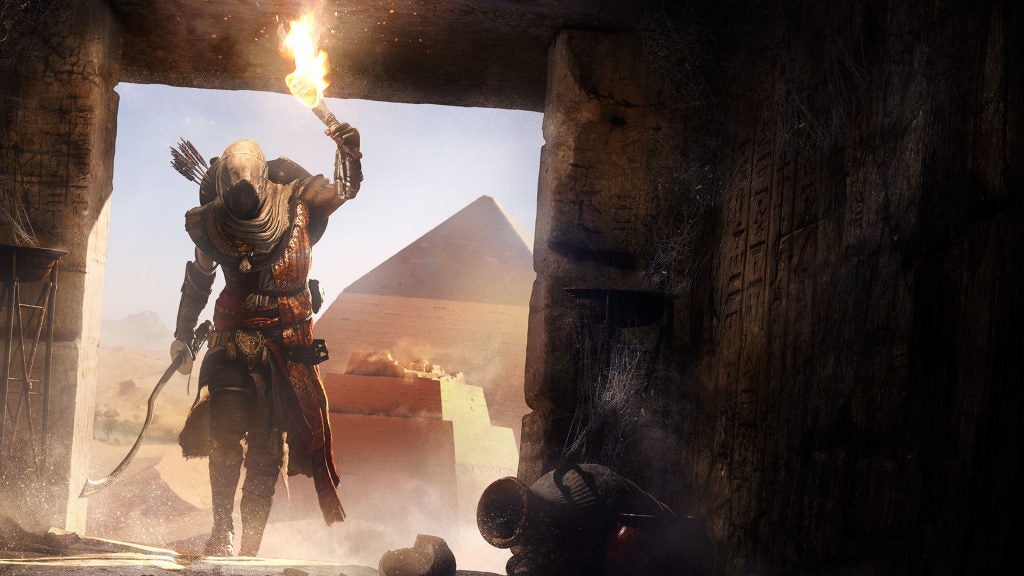
This was an easy flaw to disregard for the most part, as I was so enthralled with the bustling towns and sprawling deserts Origins offers. Ancient Egypt is the finest setting Assassin’s Creed has ever seen, existing on a whole other level to its predecessors, both visually and mechanically. It is bursting with things to do, and it’s no longer a matter of arduous busy work, such as mopping up seemingly endless collectibles and floating eagle feathers.
The majority of the side quests have been crafted with care, many carrying their own miniature narratives that are ideal distractions for those more attuned to short bursts of play. One such mission saw me befriending a down-and-out gladiator. His dominating stature soon melted away to reveal a soft-centred man with a heart of gold. It’s a shame that some of these tender moments are ruined by cutscenes where characters simply stare dead-eyed at one another, exchanging dialogue with no emotion at all.
The lavishly produced story sequences are the polar opposite and look phenomenal, making the aforementioned missteps difficult to ignore, especially when they occur so often. Origins maintains the iconic mixture of stealth, assassination and parkour platforming for which the series is renowned, but updates it in a way that’s fresh and exciting.
Related: Assassin’s Creed Origins Curse of the Pharaohs DLC hands-on
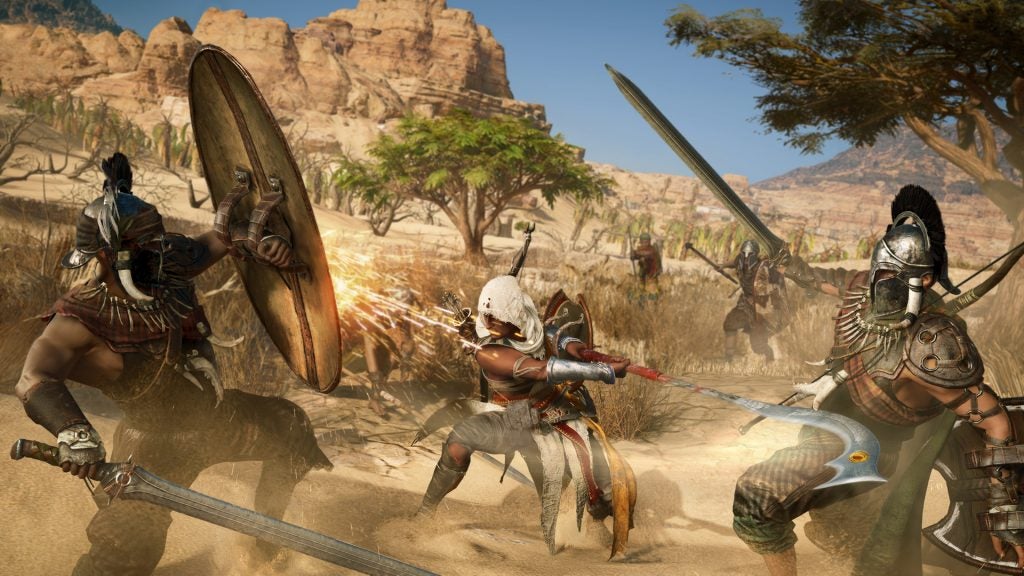
Combat has a welcome new feel, now more reminiscent of Dark Souls or the Arkham series than anything Assassin’s Creed has seen before. Attacks are performed with RB/R1, while Bayek can break an enemy’s guard with a quick tap of RT/R2. Pressing the two together unleashes a special attack that changes depending on your loadout, but always with a satisfying and flashy finisher.
You can lay into guards with an endless flurry of slashes or bide your time, waiting for a perfect parry to wipe them out in a single strike. Origins allows combat to be approached in a multitude of different ways, with each weapon feeling different to use. The mace swings with real sense of weight, while dual-wielding swords saw me darting around my foes like a maniacal doctor wielding a scalpel. Battles are a core part of Origins, so the variety on offer is impressive.
While you can’t avoid fights altogether, the option to progress through Origins with stealth as your predominant weapon is perfectly viable. Sneaking mechanics haven’t undergone the same overhaul as combat, but it still feels great to conquer an outpost as nothing but a lingering shadow. Bayek’s arsenal is incredibly malleable, with sleep darts and predatory bows proving the ideal tools for conquering many a Roman Citadel. However, the enemy AI will occasionally have a brain-fart and forget you exist, or sprint off a cliff instead of ringing the alarm.
Related: Super Mario Odyssey
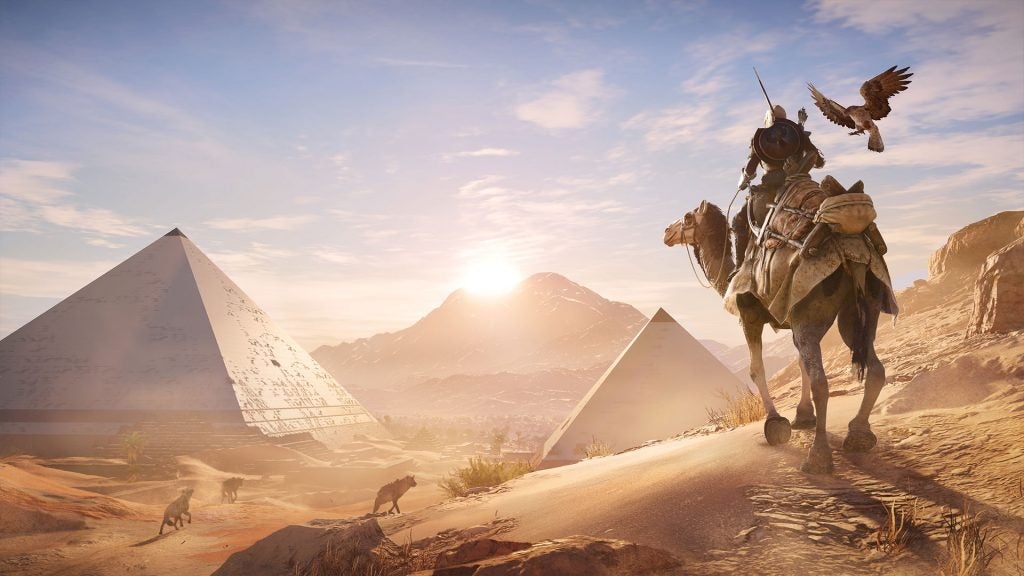
Ubisoft has taken a few obvious pointers from its open-world siblings, with Origins awash with ideas clearly inspired by The Witcher 3, Destiny and Far Cry. This sadly robs Bayek’s adventure of any real sense of originality but does result in a 30+ hour journey that is a joy to play.
Some quests will now have you investigating the environment, searching for clues that lead to the next objective. Bayek’s inner monologue is competently executed enough that I always felt invested, eager to get to the bottom of each new mystery. Side quests tend to rely on this formulaic approach a little too often though, so it becomes a case of searching for objects before your inevitable assassination target is revealed.
Origin’s inventory system also takes liberal inspiration from other titles. In a nutshell, it’s Destiny. Weapons, armour and tools are organised in terms of rarity, and old equipment can be either dismantled or sold for crafting materials. Once again, it’s not an original system, but one that serves the Assassin’s formula in a brilliant fashion. It’s a far cry from the jumbled mess of menus found in Unity and Syndicate.
Speaking of Far Cry, the open world is dotted with outposts of varying sizes, begging to be taken over. I found each a delightful playground for slaughterous experimentation. By pressing ‘up’ on the d-pad you can summon Senu, your pet eagle, to scout for soldiers, alarms and potential loot hidden within enemy camps. This soon becomes second nature, and I found myself using him whenever approaching a new location. It’s smooth, intuitive, and so much fun to go in prepared.
Related: Best Xbox One Games
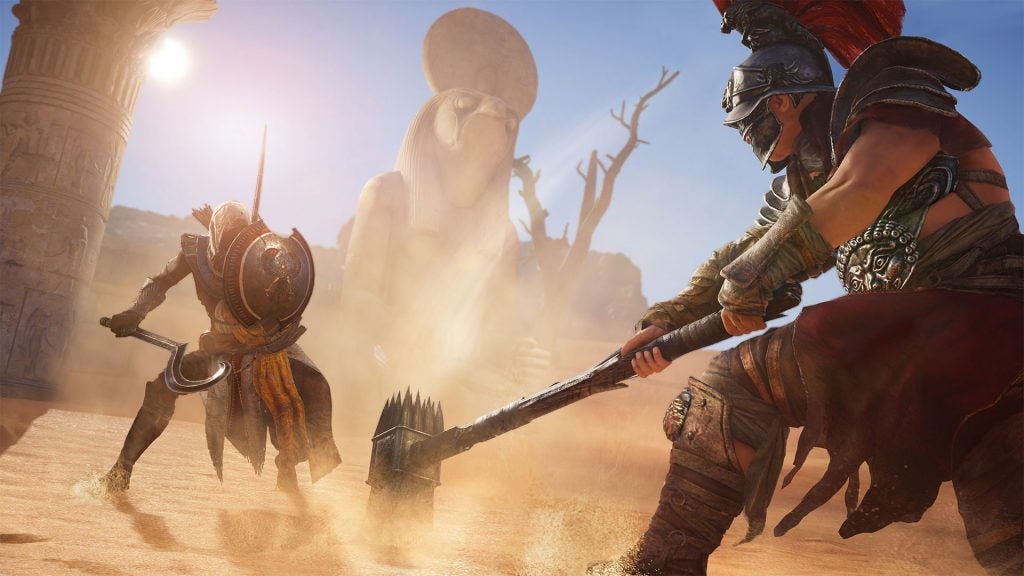
Ancient Egypt is a stunning playground – so vast that by the narrative’s conclusion, entire regions of the map remained untouched. Scaling towering pyramids and venturing into dark, claustrophobic tombs were definite highlights, presenting an overwhelming sense of scale that was almost vertigo-inducing. These are all synchronisation points too. You’ll gain access to new icons across the map before diving into a precarious hay-bale below.
Having played on a development kit of Microsoft’s Xbox One X, I was blown away by the graphical fidelity of Assassin’s Creed Origins. It’s gorgeous, showcasing immense draw distances, water effects and character models that really come to life on more powerful hardware. In terms of performance, I only found a significant drop in frame rate when cramped in a tight room, filled with enemies and chaotic fire effects. It was rock solid, and surprisingly lacking in bugs for such a large world. We’ve yet to see how it holds out on other platforms, but I hope it’s just as consistent.
Mounts can be purchased in the form of camels and horses, but they are relatively interchangeable. Dropping 5,000 drachma on a legendary ride is pointless when you find them scattered across the plains of Ancient Egypt regardless. Origins would have benefitted from a greater level of customisation overall, with many of aesthetic options beyond its extensive skill tree feeling limited.
Related: Wolfenstein 2: New Colossus
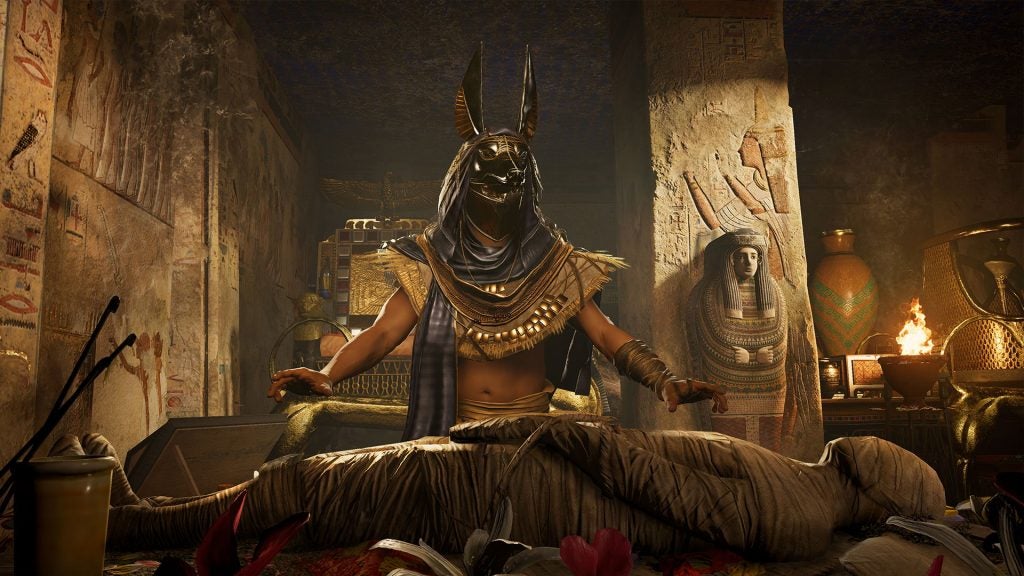
You can purchase additional weapon and costume packs with Helix Credits, a currency that can be gained by spending real-world money. I was unable to see how this played out, but Origins seems generous enough with loot that I never saw myself tempted by extra goodies.
Verdict
Assassin’s Creed Origins is the revitalisation I was desperately hoping for. My cautious optimism has been rewarded by an excellent open-world adventure that could lead to an exciting future for Ubisoft’s blockbuster franchise.
While it lifts its finer ideas from other open-world titles, it executes them well enough to form a whole that entertained me for hours and hours. It’s a shame the narrative eventually jumps the shark, or this could have been something truly special.
Order Assassin’s Creed Origins from Tesco | Amazon.com
Now, when is Ubisoft going to take us to feudal Japan?


